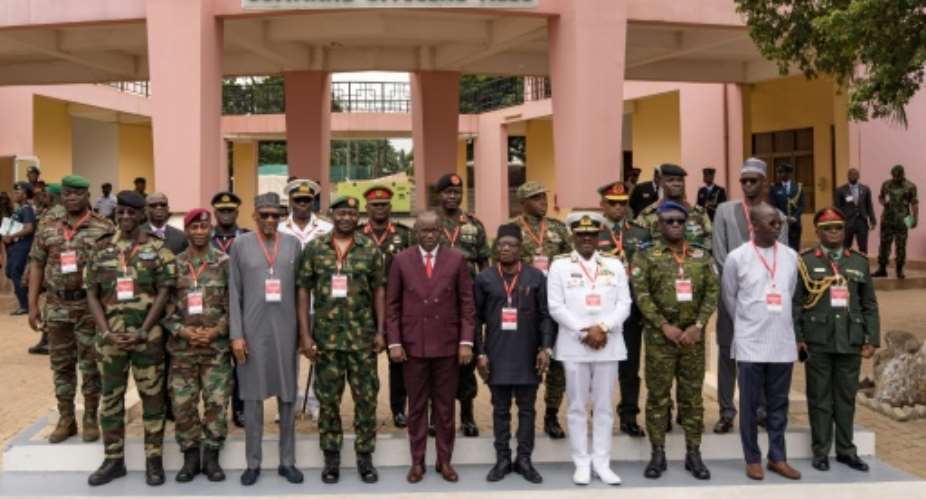West African military chiefs said on Friday they were ready for an armed intervention in Niger after a coup ousted President Mohamed Bazoum last month, but a diplomatic mission was possible over the weekend to keep talks open.
The Economic Community of West African States (ECOWAS) has agreed to activate a "standby force" as a last resort to restore democracy in Niger after generals toppled and detained Bazoum on July 26.
ECOWAS defence chiefs met this week in the Ghanaian capital Accra to fine tune details of a potential military operation to restore Bazoum if ongoing negotiations with coup leaders fail.
"We are ready to go any time the order is given," said Abdel-Fatau Musah, an ECOWAS commissioner for political affairs and security. "The D-Day is also decided."
But the leaders also say they still favoured dialogue, and that ECOWAS could send a diplomatic mission to Niger on Saturday, Musah said.
"Tomorrow there is the possibility of an ECOWAS mission going into Niger to continue to pursue the peaceful path to restoration of constitutional order."
"We are ready to resolve the issue peacefully but it takes two to tango," he said.
ECOWAS leaders say they have to act after Niger became the fourth West African nation since 2020 to suffer a coup, following Mali, Burkina Faso and Guinea.
The Sahel region is struggling with growing jihadist insurgencies linked to Al-Qaeda and Islamic State and frustration over the violence has in part prompted the military takeovers.
ECOWAS troops have intervened in other emergencies since 1990, including civil wars in Liberia and Sierra Leone. Ivory Coast, Benin and Nigeria are expected to contribute troops to a Niger mission.
'Grave consequences'
 Niger's democratically elected president, Mohamed Bazoum, was overthrown by members of his guard on July 26. By Issouf SANOGO (AFP/File)
Niger's democratically elected president, Mohamed Bazoum, was overthrown by members of his guard on July 26. By Issouf SANOGO (AFP/File)
Bazoum, whose 2021 election was a landmark in Niger's troubled history, has been held with his family at the president's official residence since the July 26 coup, with growing international concern over his conditions in detention.
ECOWAS chair and Nigerian President Bola Tinubu on Friday threatened Niamey with "grave consequences" if the new regime allows Bazoum's health to worsen under house arrest, an EU official said.
During a call to EU chief Charles Michel, Tinubu noted: "President Bazoum's detention conditions are deteriorating."
"Any further deterioration to his well-being status will have grave consequences."
Michel had renewed the European Union's "full support and backing of ECOWAS' decisions, as well as firm condemnation of the unacceptable coup de force in Niger".
Militarily risky
Details of the Niger operation have not been released and analysts say any intervention would be politically and militarily risky, especially for regional player Nigeria.
 Economic Community of West African States. By Nalini LEPETIT-CHELLA (AFP)
Economic Community of West African States. By Nalini LEPETIT-CHELLA (AFP)
Nigeria is already struggling to contain violence from several armed groups at home, and leaders in the country's north have warned about spillover from Niger across the border if there is an intervention.
Niger's coup leaders have warned against any military strikes and defiantly threatened to charge Bazoum with treason. But they have also said they are open to talks.
The military-ruled governments in neighbouring Mali and Burkina Faso have also said an intervention in Niger would be seen as a declaration of war against them.
ECOWAS has already applied trade and financial sanctions on Niger while France, Germany and the United States have suspended aid programmes.
Germany's foreign ministry has also said it wants the EU to impose sanctions on the coup leaders, saying that Foreign Minister Annalena Baerbock had held talks with her French and US counterparts.
UN rights chief Volker Turk slammed the generals who seized power on "a whim" plunging Niger further into misery and stranding thousands of migrants.
"The very notion of freedoms in Niger is at stake," he said. "Rule-by-gun has no place in today's world."





 Ejisu by-election: Police questions Kwadaso MP, two others over bribery allegati...
Ejisu by-election: Police questions Kwadaso MP, two others over bribery allegati...
 Nana Kwame Bediako is Nkrumah’s reincarnate; he’ll be president if he appoints N...
Nana Kwame Bediako is Nkrumah’s reincarnate; he’ll be president if he appoints N...
 Dumsor: Mahama gave us ‘dum, dum, dum’ but we are now in the era of ‘dum sie sie...
Dumsor: Mahama gave us ‘dum, dum, dum’ but we are now in the era of ‘dum sie sie...
 You have no right to demand KPMG report on SML deal; it’s a written bonafide of ...
You have no right to demand KPMG report on SML deal; it’s a written bonafide of ...
 Bawumia is like a chew-and-pour classmate; he crumbles when given practicals — B...
Bawumia is like a chew-and-pour classmate; he crumbles when given practicals — B...
 Dumsor: We're almost seeing the end of it — Sammi Awuku
Dumsor: We're almost seeing the end of it — Sammi Awuku
 I’ll kneel down on TV and apologize to Mahama; he’s an angel compared to Akufo-A...
I’ll kneel down on TV and apologize to Mahama; he’s an angel compared to Akufo-A...
 Government’s communication on cocaine scandal has been an unmitigated disaster –...
Government’s communication on cocaine scandal has been an unmitigated disaster –...
 FDA uncovers expired food items from storerooms of Zuarungu SHS
FDA uncovers expired food items from storerooms of Zuarungu SHS
 I’ll make small-scale miners millionaires – Bawumia
I’ll make small-scale miners millionaires – Bawumia
